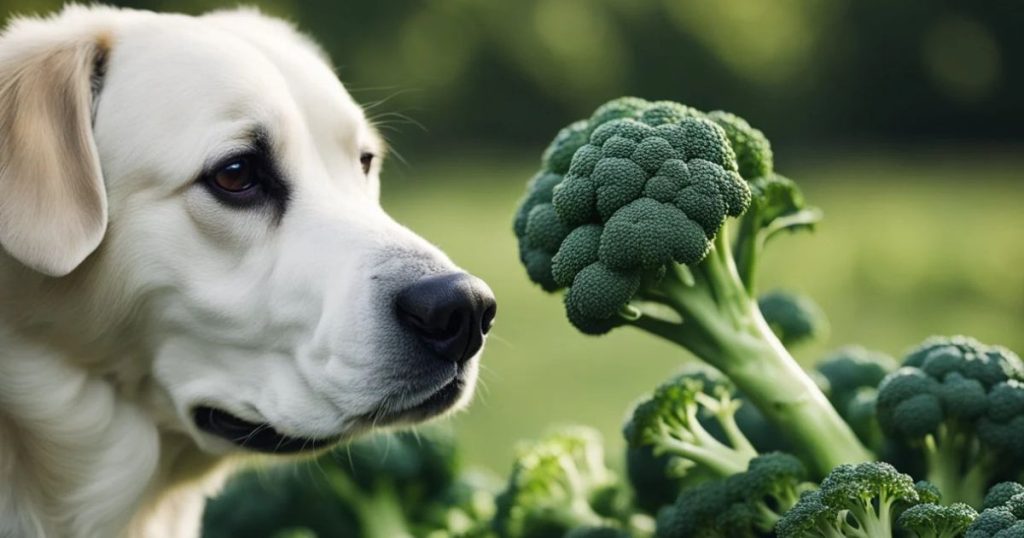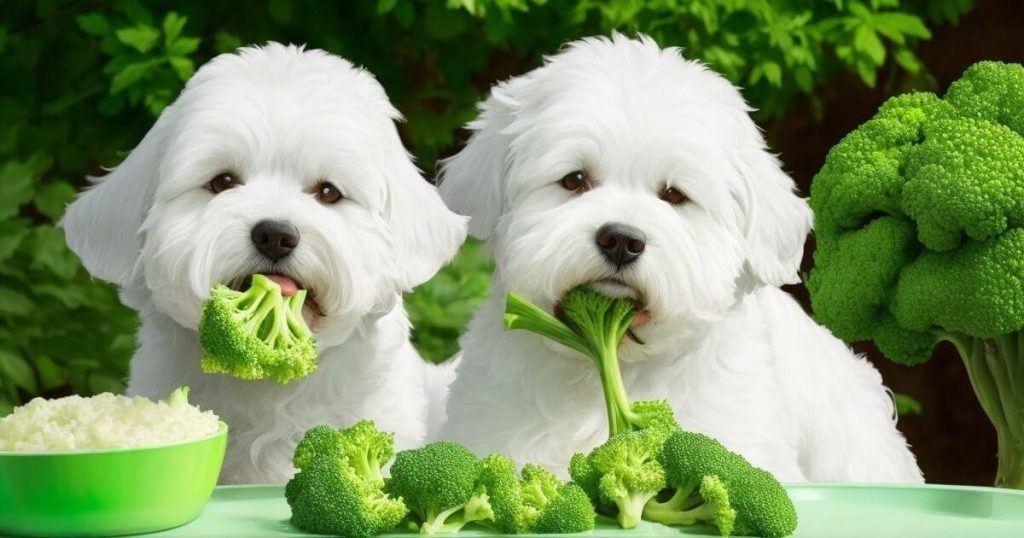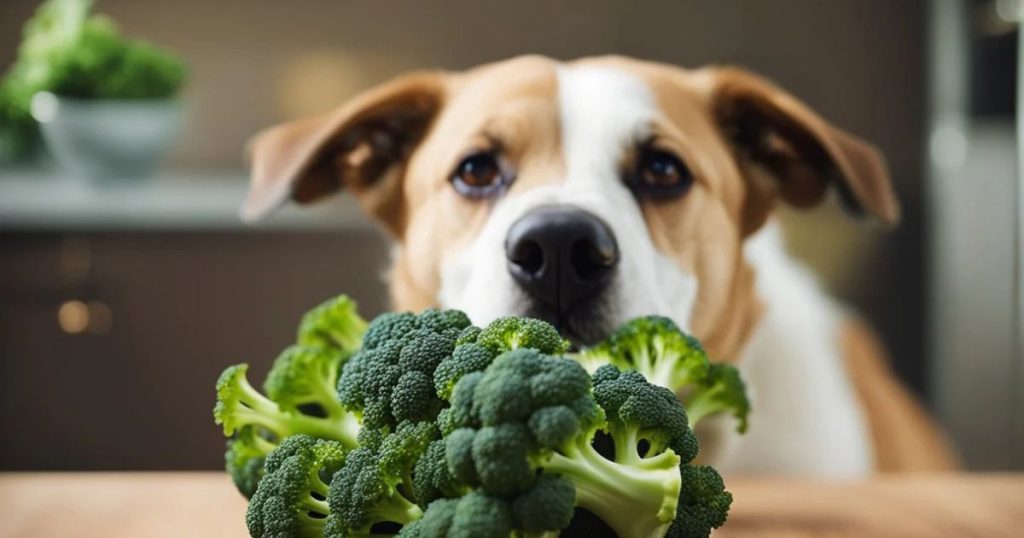As a dog owner, you’re always looking for ways to improve your pet’s diet and keep them healthy. You might have heard that certain human foods can benefit dogs while others may be harmful. One common question that comes up is, Can dogs eat broccoli? This nutritious vegetable, often considered a healthy choice for humans, is a source of vitamins and minerals. But does it have the same benefits for your furry friend? This comprehensive guide will explore whether dogs can safely eat broccoli, its nutritional benefits, any potential risks, and the best way to introduce it to your dog’sis broccoli good for dogs diet.
What is Broccoli?
Broccoli is a cruciferous vegetable in the cabbage family. It’s known for its dark green florets and thick stalks, packed with vitamins, minerals, and fiber. Broccoli is considered one of the healthiest vegetables for people because of its high antioxidant, vitamin C, vitamin K, and folate content. Thanks to compounds like sulforaphane, it’s also known for its cancer-fighting properties. But what about dogs? Can they enjoy broccoli as a healthy snack or meal supplement, or is it best avoided altogether? Let’s explore. TheexplorLet’se Short Answer is yes, Dogs Can Consume Can Dogs Eat Green Beans broccoli.
The short answer is that, when given in moderation, dogs can eat broccoli. Dogs may safely eat broccoli, and it may even offer some healthy elements. However, it’s important to understand how and when you can feed it to your dog to ensure that it’s both safe and beneficial. Before you start sharing your broccoli with your dog, several important factors must be considered to ensure that it’s safe and healthy for them to eat.
A Brief Overview of the Question: Can Dogs Eat Broccoli?
The question “Can dogs eat broccoli?” focuses on whether this vegetable is safe and healthy for canine consumption. Broccoli is non-toxic to dogs and can be a nutritious addition to their diet when served in moderation. It is low in calories, rich in fiber, and packed with vitamins such as C and K, making it a healthy snack.
However, it contains isothiocyanates, which can cause stomach upset in some dogs if consumed in large quantities. To ensure safety, broccoli should be served plain, without seasonings, oils, or harmful additives. Both raw and cooked broccoli are acceptable, can dogs have broccoli and cheese but they should be cut into small, manageable pieces to prevent choking. Consulting a veterinarian is advised before introducing new foods to your dog’s diet.
Importance of Knowing what Foods are Safe for Dogs.
Understanding which foods are safe for dogs is vital for their health and well-being. Dogs have different nutritional needs and digestive systems compared to humans, making some human foods toxic to them. For example, chocolate, onions, grapes, and xylitol can cause severe harm or even be fatal to dogs.
Knowing what foods are safe prevents accidental poisoning and supports a balanced diet, promoting a healthy weight, strong immune system, and longevity. Educating yourself about safe and unsafe foods also helps avoid costly vet visits and unnecessary suffering for your pet. Additionally, offering appropriate treats strengthens the bond with your dog while ensuring their safety. Responsible can dogs eat broccoli cheddar soup pet ownership begins with being informed about their dietary needs and potential hazards.
Nutritional Benefits of Broccoli for Dogs

Broccoli is a nutritious vegetable that can be a healthy addition to your dog’s diet when fed in moderation. Rich in vitamins C, K, and A, it supports a strong immune system and promotes healthy bones. The fiber in broccoli helps improve digestion, while antioxidants can aid in reducing inflammation and promoting overall health. Additionally, broccoli contains important minerals like calcium and potassium, which are beneficial for bone and muscle can dogs eat broccoli and cauliflower health.
Broccoli also provides a low-calorie snack option, making it suitable for dogs that need to manage their weight. However, it’s important to note that too much broccoli can cause stomach upset or gas, so it should be given in small, controlled portions. Always serve broccoli steamed or raw in bite-sized pieces to prevent choking, and consult your vet before Can Dogs Eat Broccoli adding new foods to your dog’s diet, especially if they have any pre-existing health Can Dogs Eat Tomatoes conditions.
- Vitamins and Minerals:
- Vitamin C supports a strong immune system, protects against free radical damage, and promotes healthy skin and tissues.
- Vitamin K: Essential for proper blood clotting and bone health.
- Folate: Plays a key role in DNA synthesis and helps in red blood cell formation.
- Fiber: Broccoli is a good source of fiber, which supports healthy digestion and can help regulate your dog’s bowel movements.
- Antioxidants: Broccoli contains several antioxidant compounds, including flavonoids and carotenoids, which help protect cells from damage caused by free radicals. These antioxidants may have anti-inflammatory and cancer-fighting properties, which could benefit your dog’s overaldog’slth.
- Low in Calories: Broccoli is low in calories and fat, making it an ideal snack for dogs that need to watch their weight or maintain a healthy body can dogs have frozen broccoli condition.
- Bone Health: Broccoli’s calcium and vitamin K contribute to strong bones and teeth. This is particularly important for puppies or older dogs with joint and bone health concerns.
How to Feed Broccoli to Your Dog
Feeding broccoli to your dog can be a healthy treat when done properly. Broccoli is rich in fiber, vitamins C and K, and antioxidants, which can support your dog’s immune system and digestive health. However, it should be given in moderation. Too much broccoli can cause gas or an upset stomach due to its high fiber content. To feed broccoli to your dog, start by washing it thoroughly to remove any pesticides. Cut the broccoli into small, bite-sized pieces to reduce the risk of choking. You can offer it raw or steam it lightly to make it easier to digest. Always avoid adding seasoning, butter, or oil, as these can be harmful to broccoli dog food dogs.
Introduce broccoli gradually into your dog’s diet, and observe for any signs of digestive discomfort. Consult your veterinarian if you’re unsure whether broccoli is suitable for your dog, especially if they have specific dietary restrictions or health conditions.
Serve it Raw or Cooked?
Both raw and cooked broccoli are safe for dogs, but there are some differences between the two methods of preparation:
- Raw Broccoli: While raw broccoli retains the most nutrients, some dogs may find it difficult to digest, particularly the tough stalks. If you serve raw broccoli, cut it into small, bite-sized florets to avoid choking hazards. Be cautious with the stalks as they can be hard to chew and may cause digestive issues if not properly prepared.
- Cooked Broccoli: Steaming or lightly cooking broccoli can make it easier for your dog to digest. Boiling or microwaving is also an option, but avoid adding seasonings, oils, or butter. When cooking, aim for a soft texture that’s easy that’sur dog to chew.
Serving Size: Moderation is Key
While broccoli is safe for dogs, it should only be given in moderation. As with any new food, it’s important to start with a small amount and observe how your dog reacts. Too much broccoli can cause stomach upset, gas, or even diarrhea. A general guideline is to offer at most 10% of your dog’s daily dog’s intake of treats, including vegetables like can dogs eat frozen broccoli broccoli.
Small dogs should be able to eat a few florets a few times a week, while larger dogs can handle a larger portion. Always be mindful of portion sizes and can dogs eat broccoli cheddar soup monitor your dog for any signs of discomfort after eating.
Remove the Stalks
Remove the Stalks” is a phrase that signifies the act of preparation and refinement. Whether applied to culinary tasks like separating vegetable stems for a dish or used metaphorically to describe eliminating unnecessary elements, it embodies precision and intentionality. In cooking, removing stalks ensures smoother textures and balanced flavors, symbolizing attention to detail.
Beyond the kitchen, it reflects the process of streamlining ideas or plans by shedding excess. The phrase conveys focus and efficiency, suggesting a deliberate approach to retaining only what is essential, much like can dogs eat broccoli rabe pruning a plant to encourage healthier growth and better how long is broccoli good for outcomes.
Potential Risks and Considerations

When using any substance or product, it’s important to be aware of potential risks and considerations. These can include adverse reactions, interactions with medications, and the impact on underlying health conditions. For example, some cannabis strains may cause anxiety, dizziness, or impair cognitive function, which can be more pronounced in individuals with certain mental health conditions. Likewise, products containing nicotine or THC can be addictive, with long-term use leading to dependency.
Pregnant or breastfeeding individuals should avoid certain substances because of possible danger to the growing fetus or infant. Furthermore, operating heavy equipment or driving while intoxicated can impair motor skills and judgment, leading to accidents. Always consult a healthcare professional before trying new products, especially if you have pre-existing health issues. It’s also crucial to source goods from reliable manufacturers to reduce the possibility of contamination, and to use them responsibly, following recommended guidelines for dosage and consumption.
Broccoli Contains Isothiocyanates
Like other cruciferous vegetables, broccoli contains compounds known as isothiocyanates. While these compounds benefit humans and may have anti-cancer properties, they can cause mild gastrointestinal distress in dogs if consumed in large Can Dogs Eat Broccoli quantities.
Isothiocyanates can irritate the digestive system and lead to symptoms such as bloating, gas, and diarrhea. For this reason, it’s important to feed your dog broccoli in moderation. A small serving a few times a week is typically safe, but large amounts should be avoided.
Allergic Reactions
Though rare, some dogs may be allergic to broccoli or other vegetables. If you notice any signs of an allergic reaction, such as itching, swelling, or gastrointestinal upset, discontinue feeding broccoli and consult your vet.
As previously stated, thick stalks or large chunks of broccoli might be a choking hazard, particularly for smaller dogs or those who gulp their food without chewing thoroughly. Always cut broccoli into small, bite-sized pieces before serving.
Can All Dogs Eat Broccoli?
Broccoli provides several health benefits and is generally safe for dogs to eat when given in moderation. This vegetable is rich in fiber, vitamins (like Vitamin C and K), and minerals such as calcium and iron. It also contains antioxidants that may support your dog’s immune system and overall health. However, not all dogs may tolerate broccoli equally well. While some dogs enjoy it and have no issues, others may experience gas or an upset stomach if they eat too much.
Broccoli should always be served in small, bite-sized pieces, either raw or lightly steamed, to avoid choking hazards. It’s important to avoid seasoning or adding any harmful ingredients like garlic or onions. Always introduce any new food slowly to your dog’s diet, and consult your vet if you’re unsure about adding broccoli to your dog’s meals. In general, broccoli can be a healthy, low-calorie treat when served correctly and in moderation.
- Dogs with Kidney Disease: Dogs with kidney disease must watch their potassium intake, and broccoli is high in potassium. It’s essential to speak with your veterinarian about the appropriate amount, if any, of broccoli that’s safe for a dog with kidney issues.
- Dogs with Gastrointestinal Issues: If your dog has a sensitive stomach or suffers from gastrointestinal problems, broccoli may cause bloating, gas, or diarrhea. In such cases, it’s best to avoid feeding it’scoli or other cruciferous vegetables.
- Puppies: Puppies have sensitive digestive systems, so it’s importanit’s introduce new foods like broccoli gradually and in small amounts.
Conclusion:
The answer is yes—dogs can eat broccoli in moderation, and it can offer several health benefits. Rich in vitamins, fiber, and antioxidants, broccoli is a nutritious snack that supports your dog’s immune system, digestive health, and overall well-being. However, it’s important to feed broccoli in moderation and prepare it properly. Stick to small portions, remove the tough stalks, and watch for adverse reactions if you’re vegetarian before giving your dog new foods. By offering healdog’sreats like broccoli, you’re giving your dog a tasty, nutritious option to complement their regular meals. Keep in mind that moderation, balance, and diversity are the keys to a good dog diet!
FAQ:
Can Dogs Eat Broccoli?
Yes, dogs can eat broccoli in moderation. It is a healthy vegetable that provides vitamins, minerals, and fiber. However, it ought to be administered as a special occasion rather than as a consistent component of their diet.
What Benefits Does Broccoli Offer Dogs?
Broccoli is a good source of vitamins C and K, fiber, and antioxidants, which can help support your dog’s immune system, digestion, and overall health.
Are there any Risks of Feeding Broccoli to Dogs?
While broccoli is generally safe for dogs, it should be fed in small amounts to avoid digestive upset. Broccoli contains isothiocyanates, which can cause mild stomach irritation or gas if eaten in large quantities. Always monitor your dog after feeding new foods.
How Should I Prepare Broccoli for My Dog?
Broccoli should be steamed or boiled to make it easier for your dog to digest. Avoid seasoning it with salt, garlic, or onions, as these can be harmful to dogs. You can also serve it raw but cut it into small pieces to prevent choking.
Can Broccoli Cause Choking in Dogs?
Yes, if broccoli is not cut into small, manageable pieces, it could pose a choking hazard, especially for smaller dogs. Always slice the broccoli into bite-sized pieces to reduce this risk.
